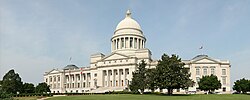| 49th Arkansas General Assembly | |||||
|---|---|---|---|---|---|
| |||||
 Arkansas State Capitol (2009) | |||||
| Overview | |||||
| Term | January 9, 1933 – March 9, 1933 | ||||
| Arkansas Senate | |||||
 Senate party standings | |||||
| Members | 35 (35 Democratic Party) | ||||
| President of the Senate | Lee Cazort (D) | ||||
| Party control | Democratic Party | ||||
| House of Representatives | |||||
 House party standings | |||||
| Members | 100 (100 Democratic Party) | ||||
| House Speaker | H. K. Toney (D) | ||||
| Party control | Democratic Party | ||||
| Sessions | |||||
| |||||
The Forty-Ninth Arkansas General Assembly was the legislative body of the state of Arkansas in 1933 and 1934. In this General Assembly, all 35 positions in the Arkansas Senate and 100 positions in the Arkansas House of Representatives were both controlled by the Democrats.